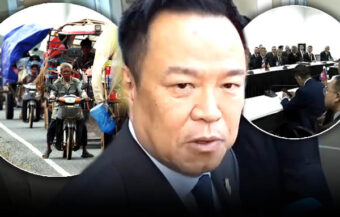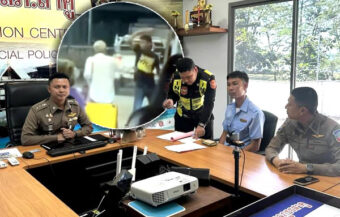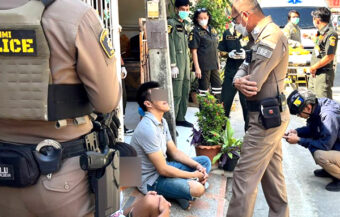Thailand blocks Starlink from entering its internet market over legal and security concerns, sharply contrasting Vietnam, potentially affecting US firms, while critics say the kingdom’s decision appears inward-looking, protectionist, and bad for its image.
Thailand’s Digital Economy and Society Minister Chaichanok Chidchob has blocked Starlink from entering the country’s internet market. On Saturday, the Bhumjaithai Party minister cited legal and national security concerns as the reason. The move sharply contrasts with Vietnam, which recently approved Starlink for up to 600,000 subscribers. Analysts say the decision could hit U.S. companies planning to expand in Thailand, as the Elon Musk-owned network is widely used by American firms.

Thailand has rejected a proposal from SpaceX to provide Starlink satellite internet services. The Digital Economy and Society Ministry cited legal and security concerns. Specifically, 100% foreign ownership of a telecom service is not permitted under Thai law.
Minister Chaichanok Chidchob said that foreign ownership is directly linked to national digital security. “If the company wants to set up a wholly owned firm, there will be no opportunity … to cooperate,” he said on Friday.
Recently, Mr Chaichanok met with Oliver Edelmann, SpaceX’s government affairs manager, to discuss potential collaboration. The talks aligned with Thailand’s space policy. The global satellite internet service SpaceX is part of Elon Musk’s business empire.
SpaceX insists on full foreign ownership to invest in Thailand despite Thai legal and security laws
SpaceX reportedly cited a White House announcement that investments in Thailand must be made through wholly foreign-owned entities. Consequently, the company warned it would not invest unless this condition was met.
However, Mr Chaichanok said he has not seen any such announcement. Therefore, he requested clarification from the Prime Minister’s Office.
Although SpaceX clarified that Starlink intends to expand internet access to remote areas, the ministry remains cautious. Even high-quality satellite services could affect existing operators, officials said.
“No matter how good the Starlink system is, we must consider the entire ecosystem,” Mr Chaichanok stated. He added that Starlink could fill gaps in underserved areas, but also alter the market structure.
Thailand’s legal framework does not allow full foreign ownership of telecom firms. Accordingly, the National Broadcasting and Telecommunications Commission will not amend regulations to accommodate Starlink.
Thai ministry maintains decision is based on legal rules and security, not technology or service quality
The ministry emphasised that the decision is based on law and security, not technology quality. Telecom ownership is considered part of the country’s digital security system.
Starlink operates low-orbit satellites to provide internet connectivity. The system has been deployed in several countries to reach areas with limited broadband. SpaceX claims its service would benefit rural and remote Thai populations.
Thailand has prioritised expanding broadband access to underserved regions. Officials focus on partnerships with domestic providers to increase coverage. Introducing a fully foreign-owned operator would conflict with existing regulations.
Meanwhile, Vietnam has taken a different approach. In March, Vietnam approved Starlink for a pilot period of five years. The plan allows up to 600,000 subscribers and does not restrict foreign ownership.
Ministry stresses compliance with law and strict ownership rules is mandatory for all foreign telecoms
Authorities in Thailand stressed that this is a regulatory issue. Even if Starlink offers advanced technology, legal compliance is mandatory. All foreign operators must follow Thai telecom laws.
Telecom operators in Thailand face strict licensing and ownership requirements. Officials said these measures maintain market stability and prevent disruptions. New entrants must comply fully with these rules.
SpaceX’s plan differs from Thai regulations. The company seeks full ownership rather than partnerships with local firms. Therefore, partial ownership or joint ventures would be necessary under current law.
During the meeting, Mr Chaichanok also discussed Thailand’s broader space policy with SpaceX. The ministry oversees satellite operations, spectrum allocation, and security protocols. Any foreign investment must meet these regulatory standards.
Legal and regulatory frameworks aim to protect telecom infrastructure and prevent market disruption
Legal and regulatory frameworks are designed to protect critical infrastructure. Telecom networks, including internet services, are part of this protected sector. Authorities warned that allowing full foreign ownership could create security vulnerabilities.
Officials noted that satellite internet could compete with existing providers, even if aimed at remote areas. Therefore, the ministry said the overall market ecosystem must be considered before allowing foreign operators.
Adjustments to regulations require formal government approval. The National Broadcasting and Telecommunications Commission has not indicated any intent to make exceptions.
Mr Chaichanok said the ministry will continue exploring ways to expand connectivity within legal limits. He added that discussions with SpaceX could continue if the company complies with ownership rules.
SpaceX has expanded Starlink services in regions where regulations allow. The company promotes satellite technology to close digital gaps. Thailand’s government, however, maintains that legal and security considerations take priority.
Thailand reinforces rules for foreign investment and conditions for Starlink’s future collaboration
The decision reinforces Thailand’s stance on foreign investment in telecommunications. Officials said rules ensure market stability and protect critical infrastructure. All operators, foreign or domestic, must meet these standards.
By rejecting a fully foreign-owned Starlink operation, Thailand makes compliance a prerequisite for investment. Authorities continue to monitor global satellite internet developments. Future collaboration could occur if SpaceX aligns with Thai law.
Democrat Attorney General of Philadelphia sues Elon Musk over his $1 million a day daily giveaway
Scammer’s plan to use SpaceX Starlink satellites in transnational scam network targeting Thailand with deception
Thailand’s approach contrasts with Vietnam, highlighting different regulatory policies in the region. While some countries allow full foreign ownership, Thailand maintains strict limits for telecom services. Officials said this ensures oversight and control over national digital infrastructure.
Ministry reiterates no exceptions for Starlink amid demand and security concerns across Southeast Asia
The ministry reiterated that no exceptions will be made for Starlink. Authorities said national law, security concerns, and market integrity remain the overriding factors.
Certainly, there is a demand in Thailand and in other Southeast Asian countries for Starlink’s high-quality service. This is particularly strong among business users who demand high-speed and low-latency connections.
At the same time, the service provided by Starlink is easily accessible in remote areas. Notably, this offers particular benefits to business users. Unfortunately, that benefit also appears to invite internet scam-type operations.
However, Starlink has a strong security system. Indeed, there is an argument that closer cooperation with Thai authorities may offer advantages in efforts to combat scam networks.
In addition, Starlink is used by American multinationals across the world. It offers them better security, faster response times, and more flexibility at a particularly affordable cost. Its lack of availability may impact US investment decisions linked with Thailand. Furthermore, Saturday’s decision is simply bad PR for Thailand, which appears inward-looking and protectionist.
Join the Thai News forum, follow Thai Examiner on Facebook here
Receive all our stories as they come out on Telegram here
Follow Thai Examiner here
Further reading:
Cambodian cybercrime industry run by Chinese criminals could be generating up to 38% of its GDP
Debt and ฿1.7 million loss to scammers drive man to murder his wife and two sons in Samut Prakan
Loan shark arrested in Nonthaburi for bullying a borrower charged an annual interest rate of 730%
Bank of Thailand to tackle household debt in new plan from 2024 which will see higher standards
Politicians skating on thin ice as the economy may not be able to withstand a political stalemate
Debt crisis may be one of the top items on the new cabinet’s agenda as central bank stands ready
Potential hazard lights flashing as kingdom’s auto loans spiral into default with sky-high borrowing


















